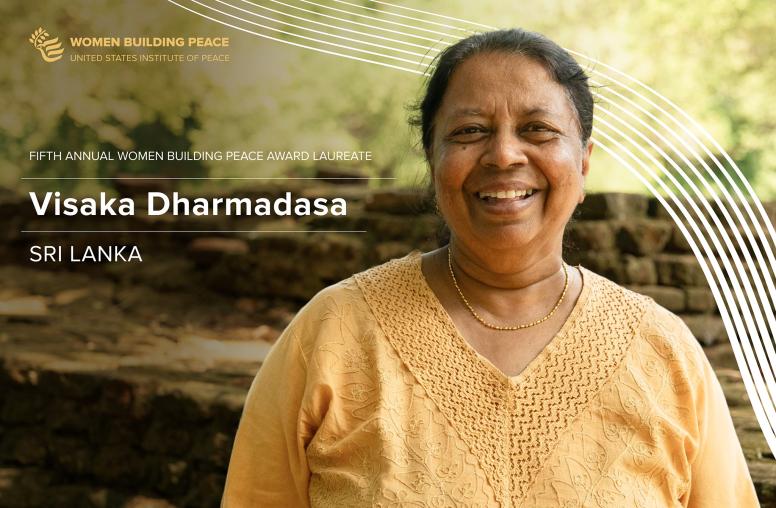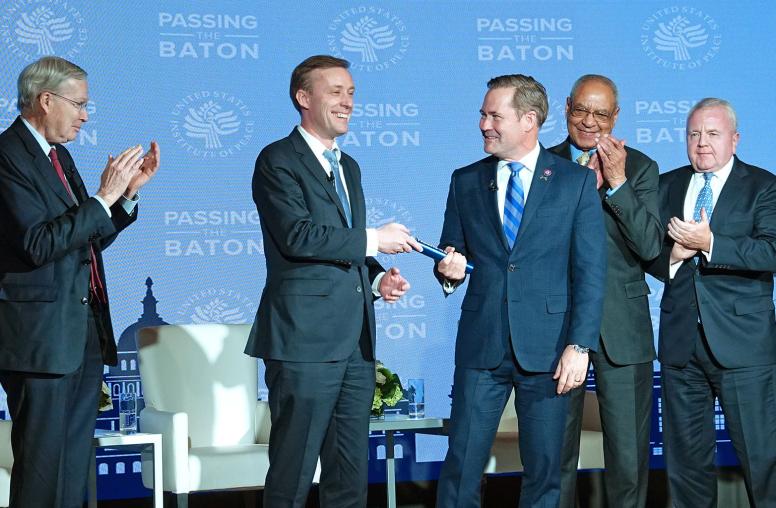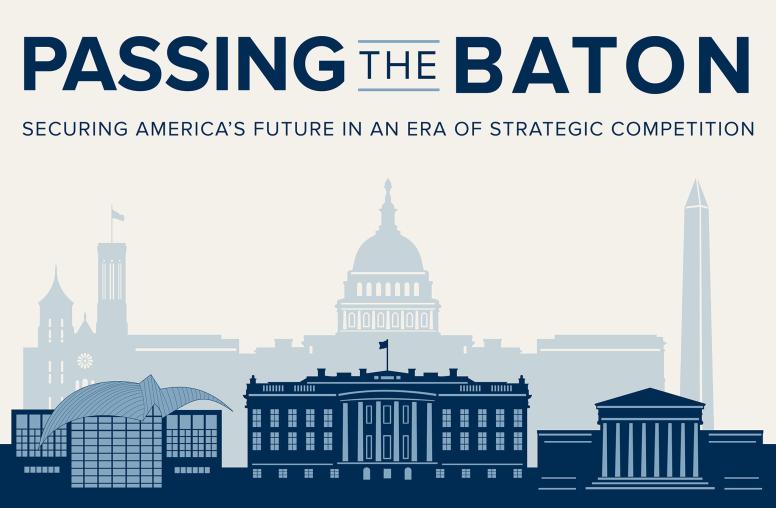From the Heart to the Horn of Africa
Series of Institute reports examine conflict on the continent.
During the last year, conflicts have exploded throughout the African continent, producing one of the most violence-plagued periods in modern African history. Struggles for power and resources, interstate suspicions and disputes and negative repercussions of the Cold War and colonial eras all have conspired to produce a deadly brew of death and destruction unrivaled by any other region in the world. The ongoing conflicts in the Horn of Africa, Congo, Rwanda, Burundi and Angola alone have led to the deaths of over 3 million people--the most cataclysmic death toll for any regional conflict since World War II.
In response, the United States Institute of Peace has produced a series of reports describing the causes and offering potential means of resolution in a number of these wars. The four Special Reports:
- Building for Peace in the Horn of Africa;
- Putting Humpty Dumpty Together: Reconstructing Peace in the Congo;
- Postgenocidal Reconstruction: Building Peace in Rwanda and Burundi; and
- Angola's Deadly War: Dealing with Savimbi's Hell on Earth,
focus on the interrelated cluster of conflicts running straight through the heart of Africa from Northeast to Southwest. Written by former Institute Executive Fellow (currently special advisor to the assistant secretary of African Affairs at the U.S. State Department) John Prendergast and USIP Africa Programs Coordinator David Smock, the reports are the result of weeks of fieldwork and interviews with hundreds of public, private, and nongovernmental leaders across Africa. According to Smock: "These reports are designed to analyze the dynamics of conflict, dissect current efforts to resolve them, and propose enhanced approaches to build peace over the long term in Africa."
From the Horn to the Heart of Africa: A Look at Conflict Across the Continent
- Already the deadliest conflict cluster in the world, the Horn of Africa has exploded again because of the once-improbable Ethiopia-Eritrea war.
- Support by Ethiopia and Eritrea for proxy militias in Somalia has reignited the Somali civil war and threatened the south with renewed famine.
- The development of the oil sector in Sudan has led that regime to expand its slow-motion campaign of ethnic cleansing, further complicating efforts to rebuild a viable peace process and ensuring the continued destabilization of northern Uganda.
- An internationally coordinated diplomatic strategy should be forged for ending the wars throughout the entire Horn region, involving the enhancement of first and second track diplomacy, support for regional dispute resolution capacity, and commitment to post-war transition planning.
- Buttressing democratic institution building in the Horn is a critical element in a broader conflict resolution strategy, including support for responsive local administration, civil society, open media, future leadership, and democratic processes.
- Development aid, trade and investment promotion, regional cooperation strategies, and economic reform advocacy could be integrated much more consciously into strategies that build for a more peaceful future in the Horn.
- Standing today at a crossroads between war and peace, the Congo threatens either to drag the entire Central African region into a quagmire of conflict or to provide the engine of economic reconstruction necessary for stability and democratization.
- The Lusaka cease-fire agreement provides a last exit on the region's highway to hell. The agreement validates both the territorial integrity of the Congo and the international responsibility to counter threats to international peace and stability, including the threat posed by those who committed the 1994 Rwandan genocide, insurgents who are now based in the Congo.
- The international community must provide robust support for the implementation of the Lusaka agreement, including its provisions for a national dialogue to address key issues of governance in the Congo and for a joint military commission (JMC) to harmonize regional efforts to disarm or otherwise neutralize the numerous Congo-based insurgencies destabilizing neighboring countries.
- The international community must also direct support toward grassroots efforts at coexistence and reconciliation; toward democratic institution building and human rights advocacy in the Congo and the surrounding region; toward economic development as a tool of peacebuilding; and toward demobilization and reintegration.
Rwanda and Burundi -- In Brief:
- Future security in both Rwanda and Burundi is closely linked to how successfully the Lusaka cease-fire agreement lays a foundation for peace in the Democratic Republic of the Congo (DRC).
- An effective, internationally supported disarmament and demobilization program for the Rwandan and Burundian rebel forces based in the Congo could significantly enhance security in the entire region.
- International support could come in part through the creation both of a Friends of Peace in the Congo donor-coordination mechanism and through the proposed International Coalition Against Genocide.
- A multifaceted program of military action, civic education, local elections, and reintegration of ex-FAR soldiers (former Rwandan Armed Forces) and Hutu refugees, has achieved progress toward enhanced security and reconciliation in Rwanda. The Arusha peace negotiations have reached a critical stage but are threatened by anxiety produced from the increasing violence in Burundi; success requires redoubled efforts on the part of both Burundian and international participants.
- Key components of the political transition process for Rwanda have recently been launched. Critical constitutional questions must be addressed and the answers widely agreed upon if genuine democracy is to be achieved at the end of the four-year transition period.
- Escalating violence in Burundi is jeopardizing the viability of the government there. Urgent efforts, particularly by Burundi and Tanzania, must be exerted to end the violence.
- Political parties in Burundi are intentionally skirting most justice issues, while Rwanda is embarking on a bold and risky new approach to try the 125,000 remaining cases against those charged with genocide.
- The rebel organization National Union for the Total Independence of Angola (UNITA) has plunged Angola back into a recurring nightmare of war and human rights depredations. Dissatisfied with any scenario in which he is not Angola's president, UNITA leader Jonas Savimbi has chosen war over peace, for the second time this decade.
- Two hundred people are dying every day. With many more people in need of assistance than in Kosovo, and higher mortality rates than in East Timor, Angola is the world's deadliest war.
- Fabulous natural resource wealth provides blank checks for the continued prosecution of the war by UNITA and the government.
- Because Angola provides 7 percent of U.S. daily imports of oil, a figure that could double in the next five years, the United States has a direct national security interest in the stability of the country.
- Given the obstacles to immediately resuming negotiations to end the war, a peace strategy must be supported which could include quiet cross-line contacts, aggressively enforcing sanctions against UNITA, and engaging with the government on good governance, human rights, and institution building.
The conflicts examined throughout the reports, particularly the wars within the Congo and (to a lesser extent) between Ethiopia and Eritrea, demonstrate the lack of faith key African actors have in international institutions. Rwanda's certainty that the world would not support its efforts to counter the genocidaires and lack of reliance of both Eritrea and Ethiopia on international mechanisms for preventing their border dispute from becoming a war highlight this crisis of faith. The responsibility for restoring faith lies on both sides: the international institutions must be made to respond appropriately, and African states must agree to abide by international rules and standards, particularly with respect to cross-border military action. Although the use of force will sometimes be necessary, more dialogue about when and how will reduce the likelihood of the use of force as the option of first resort.
In that context, it might be worth exploring an Entebbe II summit, to which a high-ranking U.S. official could reconvene the participants in the 1998 Entebbe summit in which President Clinton participated to reexamine
some of the objectives set forth at that time in the sobering aftermath of these destructive conflicts. Such a conference could address some of the fundamental themes of President Clinton's policy toward Africa, including cooperative efforts to shrink zones of instability, counter genocide, and promote democracy and human rights. Including other donor countries and African officials would diversify perspectives and provide a forum to collectively consider medium and long-term requirements for peace.
Conflict in Africa Series:
Building for Peace in the Horn of Africa. John Prendergast. Special Report: United States Institute of Peace. June, 1999.
Putting Humpty Dumpty Together: Reconstructing Peace in the Congo. John Prendergast and David Smock. Special Report: United States Institute of Peace. August, 1999.
Postgenocidal Reconstruction: Building Peace in Rwanda and Burundi. John Prendergast and David Smock. Special Report: United States Institute of Peace. September, 1999.
Angola's Deadly War: Savimbi's Hell on Earth. John Prendergast. Special Report: United States Institute of Peace. October, 1999.
For More Information:
Since 1992 the Institute has organized a wide range of programs to address sources of conflict in Africa and identify paths to peace. Countries accorded particular attention have been Somalia, Sudan, South Africa, Congo (Zaire), Burundi, Rwanda, Eritrea, Ethiopia and Angola. Over the past seven years, the Institute's Africa program has held several workshops and conferences on Africa in addition to the production of numerous books, papers, and reports on conflict in Africa.



